- Home
- Joseph Bruchac
On This Long Journey Page 9
On This Long Journey Read online
Page 9
Then that moment of silence was gone, replaced by the call to “move on,” the thump and rattle of wagons, the shuffle of hundreds of feet on the dry earth.
The last familiar face I saw as they moved away was that of Standing Turkey. He turned back, put his right hand on his chest, and then held his palm out toward me. I did the same before he was lost to my sight in the dust of the hard road.
We shall meet again in the west.
October 2, 1838
We are finally on our way. We are with the party led by Old Field and assisted by Reverend Stephen Foreman. I look forward to finding time along the way to talk with Reverend Foreman, who was educated at the Union and Princeton Theological Seminaries. I noted that a box of books was among his possessions. It has been a long time since I have held a book in my hands or had the leisure to read one.
Among the Cherokee police aiding this party is my friend Arrow Toter. I am riding with him. I am not an official member of the Light Horse, but I have been given this task of assistant interpreter and courier. Many of our people speak little or no English. My education has made me useful. Arrow Toter also knows me to be reliable, and I have kept my strength, unlike many others who are too ill to help.
My mount is my red mule Napoleyan. He refuses to allow any other to ride him and will not suffer himself to be fastened into one of the teams that draw our sixty wagons.
“Two things there are that we may do with this animal,” Arrow Toter said to me two days ago from the place where he lay upon his back. Napoleyan had just thrown him and was now innocently cropping a tuft of grass. “To shoot this mule and eat him is the first, which I would prefer.” Arrow Toter sat up, feeling for broken bones, of which there were thankfully none. “The second, which I suppose is more practical, is that you ride him.”
Among my duties, for which I will earn about twentyfive cents a day, will be to go back and forth with messages between the thirteen parties of our people. Our long line of march is now stretched out for fifty miles between here and McMinnville.
At times I may be among those who scout ahead to find camping places for the night. It is fortunate that Preacher Tsan is in our party. He can help my mother and sisters when I am not around. We expect to make no more than ten miles a day. With so many upon the road it may not be easy finding places for us to pull up our wagons and put up our tents.
October 3, 1838
White Will rode out to bid farewell. He was away from Camp Cherokee when our caravan left. He is one of the few soldiers remaining there. With some excitement he told me that he, too, would be going west. He is to be part of the detachment under Lieutenant Deas that will escort one of the emigration parties.
“Which detachment?” I asked. In truth, I already knew the answer.
“The one led by Bell,” he said.
I said nothing in return. John A. Bell’s émigrés are the remaining pro-treaty Cherokees who have turned their backs to John Ross. Of our thirteen detachments, theirs is the only group leaving our lands voluntarily. The Judas party.
I had tried to explain the division among our people to White Will. I told him that a small group of men led by the Ridges and Waties went to that infamous meeting at New Echota in December 1835 called by Reverend John Schermerhorn. Schermerhorn was despised by the other Christian missionaries. He had tried again and again to bypass John Ross. We Cherokees had taken to calling Schermerhorn “Sgina yona,” which means “the Devil’s Horn.” Fewer than one hundred Cherokee came to that meeting, not one of them a legal representative of our Nation. Among them, less than twenty men signed the treaty agreeing to our removal.
Will had listened closely. I could see that he was thinking about it.
“What is a-goin’ to happen to them what signed that treaty?”
I then explained to him that by signing away our lands, their lives were forfeit. They knew that when they signed they might also be signing their own death warrants.
Will looked thoughtful for a moment and then ventured the opinion that perhaps those Cherokees felt it was the best deal that could have been made.
That had ended our discussion. It was clear to me that White Will could not understand.
So, as we sat there this day, Will upon a fine black horse and me on my red mule, I made no mention of the Bell party. I would not see Will along the way, for I’d heard that their route would be far different from ours. They would head due west while we would swing in an arc to the north where there were more towns from which we could obtain the provisions needed for our thousands of exiles.
“Ye look differnt,” Will said. “Ye look fine.”
I looked at myself. My dress was different from that in the camp, it was true. I no longer was dressed in rags, but in serviceable clothing and boots provided to me by the conductor. I wore a sash about my waist and a turban upon my head in the same fashion as Arrow Toter. If I was to be a messenger I had to be properly attired.
Will reached inside his tunic. He brought something out and handed it to me. It was wrapped in a red cloth. I opened it to disclose a fine, long-bladed knife in a new leather sheath.
“I figgered ye could use a pigsticker,” Will said.
“Hold out your hand,” I said.
I then quickly placed in White Will’s palm the penny I had extracted from my pocket, explaining before he might ask that it was for the knife and that it was one of our customs.
White Will carefully put the penny into his left breast pocket. He buttoned it and patted his chest once with his right hand. Then he wheeled his horse and rode away without looking back. Though he had not known that to give a friend a knife is to cut their friendship unless something is quickly returned in payment, he had clearly remembered one thing I had taught him: We Cherokees have no word for good-bye.
October 5, 1838
Crossed to north side of Hiwassee River by ferry, above Gunstocker Creek. Took all day to ferry across all our wagons.
We do not have enough tents for all those in the party. Many must sleep outside or crowd together into what tents we have when rain begins to fall.
October 6, 1838
One wagon broke down yesterday. Helped replace axletree. Road slick with rain. Hard to walk without falling. It is as if the sky weeps with us, as if the muddy earth does not wish to let us go, but seeks to hold us back. Some people keep their balance by grasping the wagons. Many are covered with mud spattered on them from the wagon wheels. Duck’s Uncle, a man in his thirties who limps, almost fell beneath the rear wheel of the fifth wagon. I was riding close by and, seeing him stumble, I reached down, grasped his arm, and pulled him up. At my insistence he rode the rest of that day inside the bed of a wagon.
Too tired to write more.
October 7, 1838
Stopped for religious services. No travel today. Our movement is like that of a great army. Hundreds of wagons, thousands of horses. Some few among us are well-to-do Cherokees. They drive fine carriages and are attended by black slaves. Some of those men and women are as well dressed as any white family off to church. There are also among us white men married to Cherokee women, and white women married to Cherokee men. All are no better than Indians in the eyes of the United States, despite their wealth or dress or color of their skin.
Most of our people in this wagon train are poor. Their families have little but each other and their faith in John Ross to sustain them. When they camp at night by family groups, each lodge builds a small fire. Trenches are dug for the latrines to be used by the men on one side of the camp, while other trenches are dug on the other side for the women. Bathing areas are set aside for men and women in some nearby stream. Clothing is washed. The small evening meal is prepared and eaten. There is little conversation. Most are too exhausted or sick or dispirited to say much.
Our Light Horsemen stay at the flanks and guard our rear as we travel. We are still being harried by white men. They foll
ow us hoping to cheat us out of what little we have, or steal what they cannot get through guile. Several of our horses have been seized by white men for payment of unjust and past demands. Also we have encountered sellers of cakes, pies, fruits, cider, applejack, and whiskey. Sharks, all eager to snatch what little cash we carry. Sadly, some of us are too ready to oblige them. The Light Horse must keep an eye out for these merchants and also keep control of those Cherokees who become drunk to forget their sorrow.
Whiskey. The bane of death.
October 9, 1838
Second ferry crossing at Blythe’s Ferry over Tennessee River a short distance above Jolly’s Island at mouth of Hiwassee. Ferrymen charging the Cherokee emigrants double the normal rate. They also delay each crossing as much as possible, saying they must mend the cable, make one repair or another. The ferrymen are paid by the merchants who have made camp by the river. Though our Light Horse tries to keep the whiskey sellers away, we cannot use much force against them since we are Indians and they are white men.
October 10, 1838
Our whole party took two days to cross. Were it not for the insistence of our conductor it might have taken three days. On now to McMinnville.
October 11, 1838
The hill that rises to the top of Walden Ridge was too much for most of our teams. A two-mile ascent. Had to unhitch teams from one wagon to double them up on another. Then had to bring teams back downhill to bring up the next wagon. With sixty wagons to service in this fashion, it took a great long while to bring all to the top. Rather than making ten miles a day we have been lucky thus far to make even six. Reverend Bushyhead’s detachment is proceeding just as slowly. Three teams were needed to draw up the wagon with the beams of his church in its bed.
Excessive fees were charged for our party at the Walden Ridge tollgate. Charges are 37½¢ for four wheeled carriages and 6½¢ for each horse or ox. At least $40 for each of our detachments. Is there no end to the greed of those who are not merely satisfied with taking our land but seem to wish to drain us of our very blood?
October 12, 1838
Ascended the Cumberland Mountain today. Road slick with rain. Doubled teams. Ruts and potholes growing worse. Once again had to pay a high and unfair toll — 73¢ a wagon and 12½¢ a horse. Some of the parties behind us may try to find a road to take them around these tollgates where greedy men are cheating us.
We made eight miles today.
October 13, 1838
Descended the mountain. Brakes failed on one wagon. It overran the horses and then tipped over. One horse was killed. One older man and one young girl with broken legs. No others hurt. Our doctor set their limbs and made them comfortable. Preacher Tsan and I were among those who righted the wagon and pulled the injured out from beneath it. Rest of column continued to move while several men stayed back to repair the wagon, which will take at least a full day. It will join one of the detachments coming on behind us. Despite the accident, we made twelve miles today and halted at the Collins River. There we made camp, issued corn and fodder and cornmeal.
October 15, 1838
Rode back and forth all day to see progress of other detachments ahead and behind. Just as in our party, they find it hard to rouse the people each morning from their blankets. It sometimes takes all of the morning to get everyone upon the trail again, moving forward in a slow shuffle. People turn and look back at our mountains with tears in their eyes. Each day at least one person does not rise from their blankets and a grave must be dug by the roadside.
In some detachments whooping cough has appeared once again among the small children. We are still suffering for the want of sufficient clothing. We have been promised that warmer clothes will be issued when we reach Nashville, where Lewis Ross has contracted for our supplies. Eighty or ninety people now on the sick list.
Trouble in Reverend Bushyhead’s party with their animals. The oxen have eaten poison ivy and are sick. They have pulled over until the oxen are well again. Detachment led by Situwakee and Evan Jones has passed them.
October 19, 1838
Passed through McMinnville in early morning; watered horses and oxen at ford in river. Next water was twelve miles ahead. Made camp at Stone’s River near Woodbury. Ben Rainfrog kicked by his horse while it was being reshod. Two broken ribs.
October 20, 1838
I have written nothing about my family for some time. It is because we have been blessed with as good fortune as anyone may enjoy on this sad journey. My dear mother and my two sisters are strong and well. All of them are able to walk and keep up with the wagons without any great difficulty. My mother has taken on the task of driving the oxen that pull the wagon. She strides beside them with a long whip that she cracks over their backs, popping the air but never touching the animals themselves. Emily’s cough has completely vanished. Ruthie has grown an inch in height and now she is the sister who is always hungry. I am thankful for their health and for the help our dear friend Preacher Tsan gives them almost every day.
Elizabeth remains with us also. Today she gave me a scarf to wear about my neck. I did not know what to say, but she knotted it about my neck and then looked up at me with satisfaction. Napoleyan nudged her gently with his nose as she stood beside me. She responded by stroking his cheek. He seldom favors anyone in this way, far preferring kicks and bites as a show of affection. I took it, as did Elizabeth, that my cussed mule approves her presence in our company.
October 21, 1838
Rode ahead ten miles and spent this day with Reverend Jesse Bushyhead’s detachment. Oxen are recovered from the poison ivy, but their progress is still slow. They have been encamped two days now, remaining near McMinnville, Kentucky, to regain their strength. Many old and infirm in his party as well as a number of discontents who have given themselves to drink. Though there are many Christian Cherokees in his party, the great majority do not profess any Christian faith.
Shared in Reverend Bushyhead’s services, which took place in the old mill at Shell’s Ford on the Collins River, where he preached to a large audience. Three were baptized.
A good number of the white citizens of McMinnville took part in the services and commented on how fine a preacher Reverend Bushyhead is. There is much sympathy in this town for the Cherokees.
October 22, 1838
Reverend Bushyhead’s party held a council. They were compelled to leave without satisfaction of their claims. They fear fraudulent demands will be made to defeat them. They urge that no further consideration of these demands be had while the Indians are denied the opportunity to being present or represented. I am carrying this message from them to John Ross. I will ride back with it until I meet Lew Hildebrand or another of our Nation’s couriers who will carry it the rest of the way.
October 25, 1838
Rode ahead with a message for Conductor Elijah Hicks. Today was spent in the company of the Hicks party. They have experienced considerable difficulty with drunkenness. My friend Bear in the Water is with this party. When first he saw me early in the morning, he raised his hand in greeting and made no move to come closer. I know it was because he did not wish me to smell the whiskey upon his breath. My heart sank in my chest when I saw him, but I raised my hand back in greeting toward him and then I moved on to deliver my messages.
Nocowee, who had been one of the leaders of this party, has completely given himself up to whiskey. For several days the Light Horse had to drive him along the road with his hands fettered.
Chief White Path died today. His age, his sickness, and the hardships of the journey were too much for him. I watched this evening as he was buried close to the road, facing the east. Bear in the Water was one of those who helped dig the grave. He seemed sober, and there were tears in his eyes. White Path was his uncle. A tall pole painted white was erected over White Path’s grave. A flag of white linen flies from its top to tell all who pass that the body of a great man rests here.
On this same day tw
o infants were also buried.
November 5, 1838
Perhaps it is hard for you to imagine what it is like in our villages upon wheels. Here is a description of how each of our camps are set up each day.
In the morning, the first to leave are the hunters. With bows and arrows and their long blowguns (which are excellent for such small game as birds and squirrels) they fan out to either side of the route of march. Our conductor has told them where our camping place will be that night, and they will meet us there. All through the day they hunt, and when we see them again each shall have whatever game they could catch. One may bring in a brace of turkeys, another may be waiting with a fat deer. Yet another carries three squirrels, each pierced in the neck by a blowgun dart.
After the hunters, the wagons set out. The first to go is the wagon farthest along the trail, for our camps are made in a long line of lodges, each family or wagon setting up their own lodge circle. When that wagon reaches our next appointed camp, it will be the first to stop. The second wagon will go beyond it and make their halt and so on. Thus, the next morning the first to set out shall be the one that was last the day before.
At the next camp, ten miles farther down the road, the Commissary and Assistant Commissary will be waiting with wagons driven by local farmers, filled with the corn and fodder we have purchased. If we are fortunate, we shall be near a mill, and the corn will be ground. If not, then the women of each lodge will bring out their mortars, the hollowed base of a tree. Then, with wooden pestles, they will pound the corn, sieve it out, pound it again, and so on until there is enough flour for cooking.

 Peacemaker
Peacemaker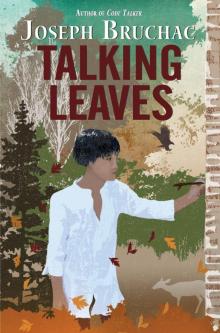 Talking Leaves
Talking Leaves Found
Found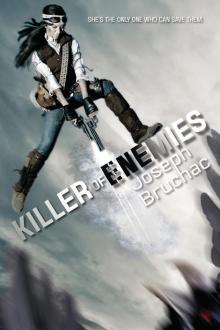 Killer of Enemies
Killer of Enemies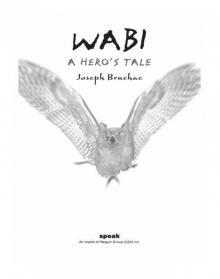 Wabi
Wabi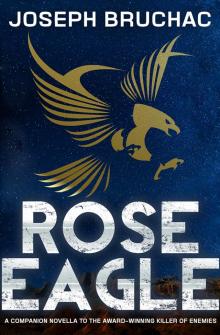 Rose Eagle
Rose Eagle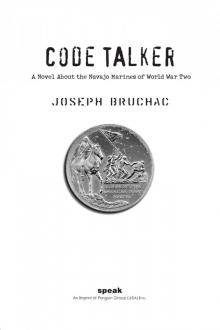 Code Talker
Code Talker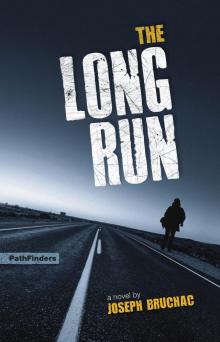 The Long Run
The Long Run Dragon Castle
Dragon Castle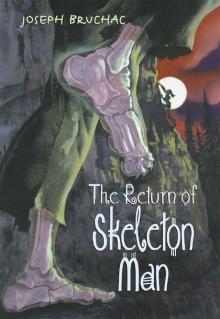 The Return of Skeleton Man
The Return of Skeleton Man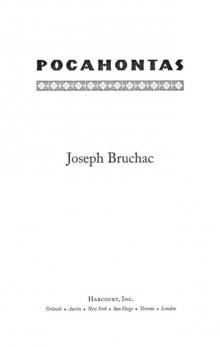 Pocahontas
Pocahontas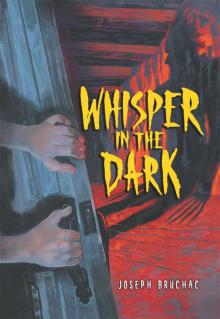 Whisper in the Dark
Whisper in the Dark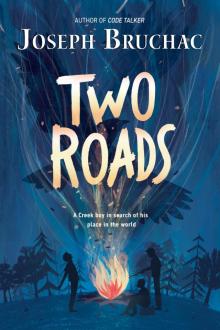 Two Roads
Two Roads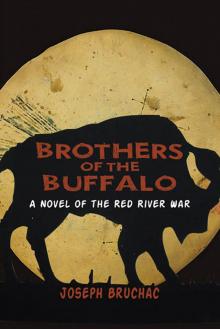 Brothers of the Buffalo
Brothers of the Buffalo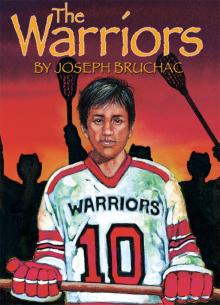 The Warriors
The Warriors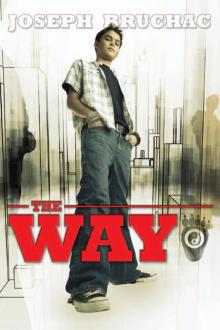 The Way
The Way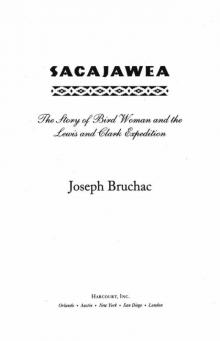 Sacajawea
Sacajawea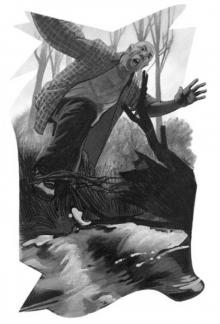 Night Wings
Night Wings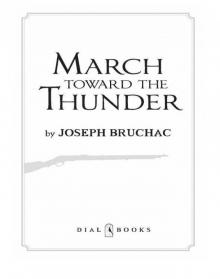 March Toward the Thunder
March Toward the Thunder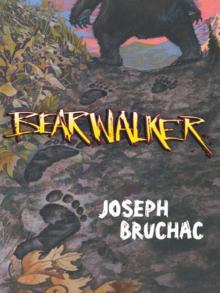 Bearwalker
Bearwalker Skeleton Man
Skeleton Man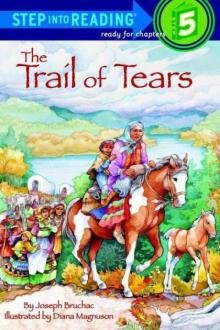 The Trail of Tears
The Trail of Tears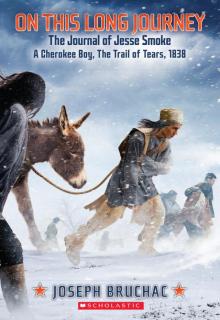 On This Long Journey
On This Long Journey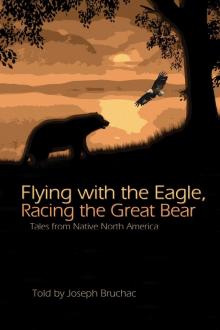 Flying with the Eagle, Racing the Great Bear
Flying with the Eagle, Racing the Great Bear